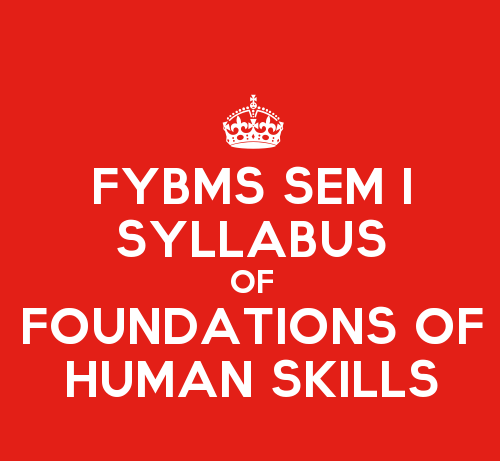UBMSFSI. 1: Foundation of Human Skills – 50 lectures, 3 credit.
Foundation of Human Skills is a Semester 1 subject of FYBMS. Foundation of Human Skills is introduced in FYBMS to make the BMS students understand the basic behavior pattern of human which is the most important resource of a business and to deal with them in an apt manner. The subject helps in dealing and negotiating with different kinds of human nature and greater awareness of the human behavior.
Unit 1 – Understanding of human nature includes the following topics:
a) Individual Behaviour – 3 lectures
- Concept of a man,
- Individual differences,
- Factors affecting individual differences,
- Influence of environment.
b) Personality and attitude – 6 lectures
- Determinants of personality
- Personality traits theory
- Big five model
- Personality traits important for organizational behavior like authoritarianism, locus of control, Machiavellian ism, introversion-extroversion achievement orientation, self-esteem, risk taking, self-monitoring and type A and B personalities.
- Concept of understanding self through JOHARI WINDOWS
- Nature and components of attitude
- Functions of attitude
- Ways of changing attitude
- Reading emotions
c) Thinking, learning and perceptions – 8 lectures
- Thinking skills, Thinking styles and thinking hat
- Managerial skills and development.
- Learning characteristics, theories of learning (Classical conditioning, operant conditioning and social learning approaches)
- Intelligence, type (IQ, EQ, SQ, at workplace)
- Perception features and factor influencing individual perception
- Effects of perceptual error in managerial decision making at work place (Errors such as Halo effect, stereotyping, prejudice attributional)
The Unit 2 includes the following topics:
d) Introduction to Group Behaviour: – 6 lectures
- Group Dynamics-
- Nature,
- Types,
- Group behavior model.
- (roles, norms, status, process, structures)
e) Organizational processes and system – 6 lectures
- Power and politics –
- Nature,
- Bases of power,
- Politics nature,
- Types,
- Causes of organizational politics,
- Political games
- Organizational conflicts and resolution:
- Conflict features,
- Types,
- Causes leading to organizational conflicts,
- Levels of conflicts,
- Ways to resolve conflicts through five conflicts resolution strategies with outcomes.
Unit 3 includes the following topics:
f) Organizational Culture – 5 lectures
- Characteristics of organizational culture
- Types, functions and barriers of organizational culture
- Ways of creating and maintaining effective organizational culture.
g) Motivation at work place – 5 lectures
- Concept of motivation
- Theories of motivation in an organizational setup: A. Maslow need hierarchy, F. Hertzberg dual factor, Mc. Gregor theory X and theory Y.
- Ways of motivating through carrot (positive reinforcement) and stick (negative reinforcement) at workplace
The Unit 4 includes the following topics:
h) Organizational change and creativity-
- Concepts of organizational change
- Factors leading /influencing organizational change
- Kurt Lewins model of organizational change and development
- Creativity and qualities of a creative person
- Ways of enhancing creativity for effective decision making
- Creative problem solving
i) Organizational Development and work stress: 6 lectures
- Need for organizational development
- OD Techniques
- Stress, types of stress
- Causes and consequences of job stress
- Ways for coping up with job stress
The list of Reference books of Foundation of Human Skills are as follows:
- Organizational Behaviour – S. Robbins, Prentice Hall
- Organizational Behaviour – John W. Newstrom and Keith Davis, Tata McGraw Hill
- Organizational Behaviour – Fred Luthans, McGraw Hill, Newyork
- Organizational Behaviour – K. Aswathappa, Himalaya Publishing House
- Essentials of Management – Koontz, Harold, Tata McGraw Hill




15 Comments